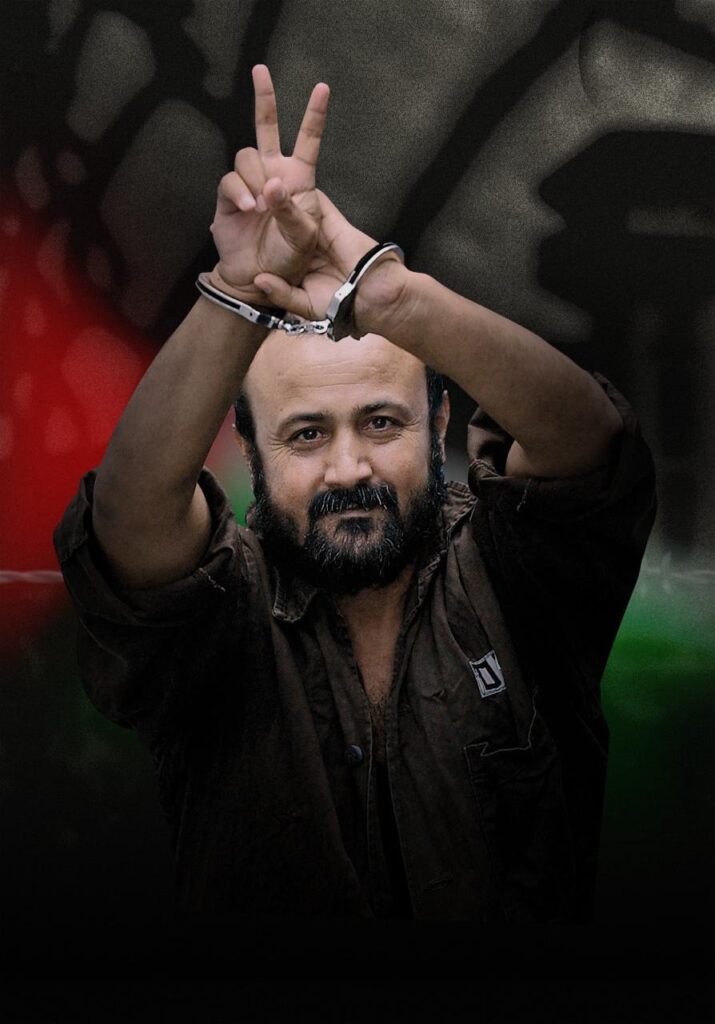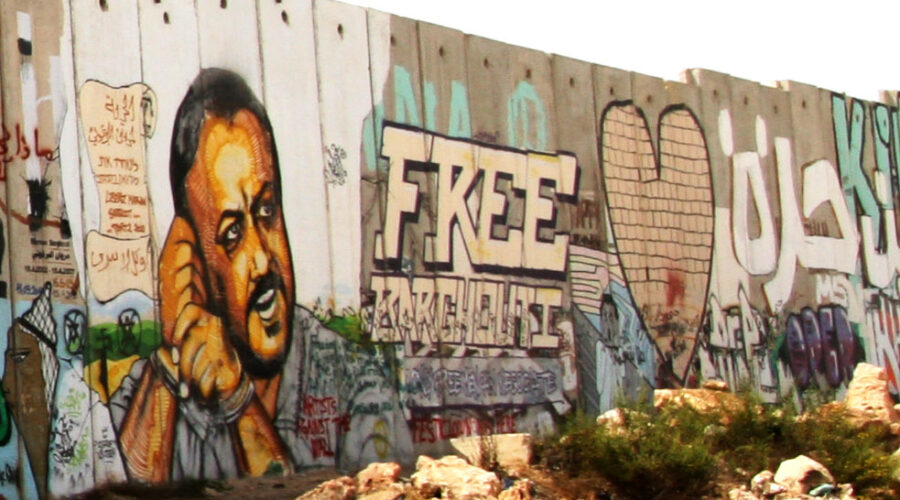He is defiant and dynamic as ever. Rather than speak about himself, his stolen freedom, the lost moments with sons and daughters and granddaughters, or even the kangaroo court that indicted him, Barghouti wants to talk about peace. He insists to his interviewer that “We need two leaders that are ready to take critical decisions… take risks… from the Israeli side and the Palestinian side, and I think that my people [are] ready for peace with the Israeli people.”
Years later, the unbearable events of the past months seem to have pushed the Palestinians and Israelis further than ever from the point of reconciliation, the place of hope for an attainable peace.

Indeed the answer to the question of when there will be peace has been kept behind Israeli bars, beleaguered by perpetual assaults on mind and body in increasingly stark conditions, and at times in solitary confinement; like a cancer, it is to be contained for fear of it spreading.
Whatever you may think about Barghouti, there is an undeniable visionary’s luminescence about him. Unlike the stale and dusty fixtures of the Palestinian Puppet Authority, Barghouti is fresh and vibrant.
In the wake of October 7, Barghouti, who is serving five life sentences for a spurious murder conviction, has not been spared the tragedies of Gaza. His captors sought to up the ante because, surely, in an exercise of collective punishment, the most brutal of punishments must be served on those who would relish the status quo. Who stand for everything this Israeli government has sought to destroy.
Israel’s unsubstantiated allegations against Barghouti are mere projections of an entity that has done, and continues to do, far worse. To the countless Palestinian prisoners and “free” Palestinians in the occupied territories alike.
Barghouti is not an evil man, as Israel would have the world believe. His message is one of peace. This is perhaps what Israel’s cabal of war mongers fear most.
Barghouti’s fatal flaw is his inestimable grit. It chafes at those who would prefer to do away with the process for peace, and the Palestinian question, altogether. Gil Scot-Heron once said that “the only problem with peace is that you can’t make no money from it.”
Since October 7, Barghouti has been beaten, mercilessly tortured, and deprived of his senses. For the past 22 years Barghouti has sporadically endured similar treatment, as and when the Israelis have felt like inflicting it. He has been denied access to the ICRC since 2017 and regularly deprived of his family visitation rights. These are the means to an end that aspires to see the crushing of his indefatigable spirit.
Barghouti is in prison because he is popular. Because his rhetoric is emblazoned with the promise of a vibrant Palestinian ecosphere. Barghouti is in prison because he is capable of bringing people together, and it is easier to crush a fragmented society than one that is resolved in its message. Barghouti is in prison because most Palestinians would have him be their voice.
As a Palestinian, I would have him be my voice.
This may be a Barghouti bias, but the writing is on the wall, as the saying goes, and what is written is Marwan Barghouti. This is not a romantic or an idealised notion. Barghouti serves as a reminder of all those Palestinian prisoners behind bars without basis. He is a relic of justice that is overdue, of unfulfilled self-determination and of an ever-elusive Palestinian democracy.
Barghouti may be the only and last chance we have for peaceful coexistence. He is the middle ground. Without him, Israel and Palestine’s children forfeit their final chance at redemption. The vicious cycle of violence, repression, and disillusionment will be doomed to continue ad infinitum. The military industrial complex will prevail.
At one point, Barghouti’s interviewer challenges him to express his views on suicide bombing of women and children. His response is firm and unequivocal:
“Nobody can justify killing civilians, children, women, anywhere in this world. They should be outside of the game. This should be very clear. In Palestine and in Israel.”
The rules of the game have changed today, or maybe it is simply their imbalanced application that has been revealed. Either way, it is perhaps only a voice like Barghouti’s that can bring us back to the place where peace was possible.
Image: Anna, and second image used with permission

